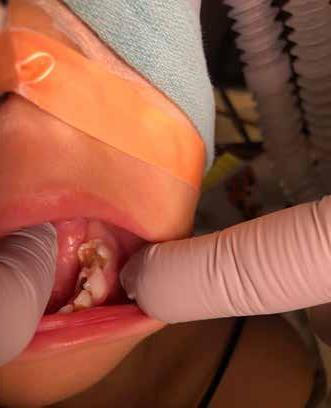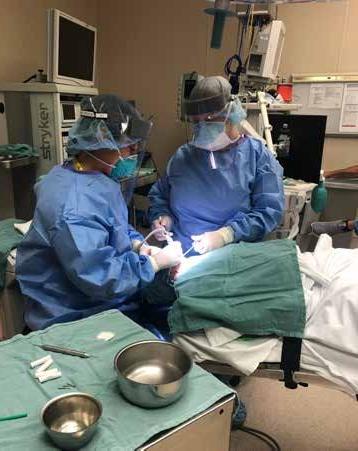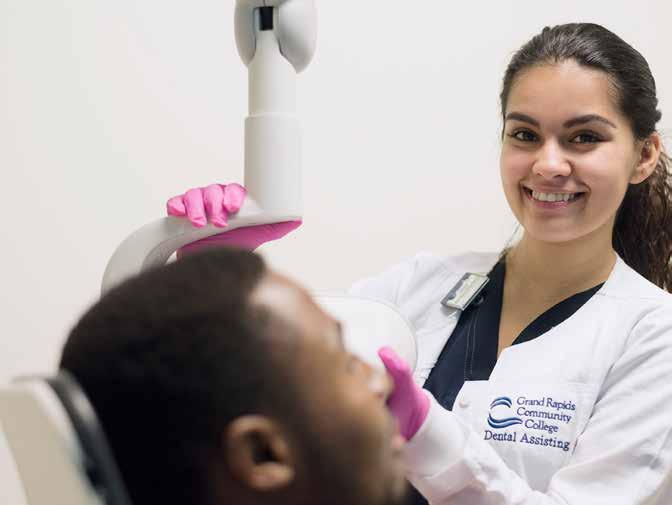
9 minute read
SECTION THREE: COVER STORY
COVID-19 Pandemic Results in Severe Operating Room Access Limitations for Pediatric Dentists
Submitted by Suzanne Port, DDS, MS, Holland and Veronica Hamilton, DDS, MS, Grand Rapids Photos by Andrea Gonzalez-Medina, RDA
Advertisement
As you know, the coronavirus has had a significant impact on all dental at a rate that can meet the overhead required to safely run an operating practices throughout the state. During the shutdown, when we were room. Lack of access to operating rooms at Spectrum Health facilities all at home learning what our “new normal” was going to look like, affects patients all over the State of Michigan, as patients who require the pediatric dentists in West Michigan were dealt a huge blow in the this level of care are often referred to us from surrounding areas. We form of an email from Spectrum Health. Spectrum Health facilities are have reached out to the other hospital systems in West Michigan in where all pediatric dentists in West hopes of obtaining block time at their Michigan complete complex full mouth facilities and have been told that they reconstruction cases under general “Spectrum Health had too are not accepting pediatric dental anesthesia. This email was received in early April and informed us that eliminated block time for all cases in their operating rooms. Spectrum Health had eliminated block time for all pediatric dentists effective immediately. Block time is when a pediatric dentists effective immediately. Block time is It is imperative that pediatric dentists have access to operating rooms in their community. Patients requiring treatment specific surgeon is assigned an operating room for a partial or full day of cases, on when a specific surgeon is under general anesthesia are often under the age of 6, with multiple quadrants of recurring days each month. The email assigned an operating room decay, abscesses, pain, and dysfunction. also notified us that this cancellation of block time was already planned to for a partial or full day of They are young, uncooperative, and/or have special needs. These take place in October 2020. Due to the cases, on recurring days patients come from all socioeconomic coronavirus pandemic and the resulting backlog of elective surgeries across all each month.” backgrounds and often have traveled to West Michigan from other parts of disciplines, Spectrum Health moved up the state to seek care. These patients this timeline to take effect immediately. are not able to be treated awake due Prior to this email, we had no knowledge that we were no longer going to their extensive treatment needs and their inability to cooperate. to have block time and be able to see patients in an operating room at If treatment were to be performed awake it would result in multiple Spectrum’s facilities. appointments in protective stabilization (i.e. papoose). According to the American Academy of Pediatric Dentistry (AAPD), the use of protective So why did Spectrum Health decide to make this drastic change? stabilization is contraindicated in “patients with non-emergent These types of cases are billed both to medical insurance and dental treatment needs in order to accomplish full mouth or multiple quadrant insurance. The anesthesia provider bills the medical insurance for dental rehabilitation.” It is only indicated for “a patient [that] requires anesthesia services provided and the dental provider bills dental immediate diagnosis and/or urgent limited treatment and cannot insurance for the procedures they complete. Medical insurance cooperate due to emotional and cognitive developmental levels, lack reimbursement for general anesthesia provided during a dental case of maturity, or medical and physical conditions.” 1 The patients we is very low in comparison to other surgical procedures of the same treat under general anesthesia do not fit these criteria for protective duration. At this time, medical insurance is not reimbursing the hospital stabilization and treatment awake is not an option.
Once we were notified that Spectrum Health had eliminated our block time, we immediately contacted the American Academy of Pediatric Dentistry (AAPD) for guidance. They informed us that access to operating room time for pediatric dentists is becoming a nationwide problem. The AAPD recognizes the importance of dental care under general anesthesia, stating, “The AAPD affirms that hospitals or outpatient settings providing surgical treatment should not discriminate against pediatric dental patients requiring care under general anesthesia. Such patients and their care providers need access to these facilities. The dental patient, as with any other patient, should have the right to be seen in a timely manner. Evidence has demonstrated dental treatment under general anesthesia in the operating room is a necessity, as well as an important component of comprehensive care, to assure optimal health for many, especially for those considered high risk.” 2 The AAPD is aware of this issue and continues to advocate for the patients’ right for access to care. Multiple Michigan Academy of Pediatric Dentistry board members, as well as many pediatric dentists in our membership, are reporting the same difficulties with different hospital systems across the state. This is a nationwide access to care problem that does not show signs of going away anytime soon.
A local three year old patient with severe dental caries best treated in the operating room setting by a pediatric dentist.
Another intraoral photo of the same patient showing severe decay.


What about providing general anesthesia in the dental office? In this treatment scenario, an anesthesia provider comes to the dental office and places the patient under general anesthesia, allowing the dental provider to complete full mouth rehabilitation. There are multiple roadblocks in this scenario when providing care to a pediatric patient. The general consensus is that patients must be at least 3 years of age and over 15kg. Regardless of age, only healthy patients, those who are ASA1 and possibly ASA2, can be seen for general anesthesia in the office setting. Even once these clinical criteria are met, medical insurance can present major problems that result in an access to care issue. A large percentage of patients who need general anesthesia for dental rehabilitation have Medicaid. However, Medicaid will not reimburse for general anesthesia provided outside of a hospital setting. This means that patients with Medicaid cannot receive general anesthesia in the dental office. Prior to 2018 there was a medical anesthesia group who would come to dental offices to provide general anesthesia. However, this group didn’t accept any medical insurance and the patient would be responsible to pay the anesthesia group directly. The patients who could afford to be seen would then have to go to their medical insurance company to seek reimbursement. This limited the number of dental patients who could be seen under this model. This medical anesthesia group has made the determination that they will no longer be coming to pediatric dental offices to provide this service.
So how can local dentists help? Please keep in mind the difficulties that we are facing when you are referring patients to our offices. Understand that it may take longer to get a general anesthesia case scheduled as we vie for operating room time. Prepare your patients for a possible waitlist to get treated under general anesthesia. Please know that we are dedicated to our patients and those who refer patients to us and we will continue to work towards a solution. We know that the situation will continue to evolve and we look forward to collaborating with our partners at Spectrum Health and in the community. Lack of continuous access to an operating room results in lack of access to care for our highest risk pediatric dental patients. It is our duty to provide our patients with the very best care possible and we will continue to work with Spectrum Health, the other hospital entities in West Michigan, and other anesthesia providers in order to move towards our common goal—taking care of the children of Michigan.
So if we can’t treat these patients in the office due to behavior, can’t get time in the operating room, and can’t get medical anesthesiologists to come to our office, what do we do? The treatment these patients require is too extensive for protective stabilization or conscious sedation, and deep sedation requires an anesthesia provider. Without access to an operating room, we are left with thousands of pediatric dental patients in West Michigan who will not have access to proper dental care. We have been working with Spectrum Health to create a list of criteria which will allow us to take some patients to the operating room for care. At this time, patients who are medically compromised or under the age of 3 will still be allowed to receive care at a Spectrum Health facility. Currently, we are still able to request operating room time at Spectrum Health for all of our patients and have had varying results. When an operating room is not being used by another surgeon, we have been allowed to request that time for our cases. With this limited access, we have been able to treat a lot of our backlog of cases. We are concerned that this sporadic access may be going away completely in the next few months. Currently, there are three work groups collaborating on long term solutions to this access to care issue. These work groups consist of representatives from Spectrum Health, the pediatric dental community, and multiple community healthcare partners. We hope these workgroups will result in increased access to the operating room, not only at Spectrum, but also across other hospital systems in Michigan and nationwide. We are working to try to find alternative treatment locations and are in discussion with another anesthesia group who would be providing care in the dental office setting, but a full long-term solution is still undetermined.
1 American Academy of Pediatric Dentistry. Protective stabilization for pediatric dental patients.
The Reference Manual of Pediatric Dentistry. Chicago, ILL.: American Academy of Pediatric
Dentistry; 2019:280-5.
2 American Academy of Pediatric Dentistry. Policy on hospitalization and operating room access for oral care of infants, children, adolescents, and individuals with special health care needs.
The Reference Manual of Pediatric Dentistry. Chicago, Ill.: American Academy of Pediatric
Dentistry; 2019:118-9. After hearing Drs. Port and Hamilton present this information at a WMDDS Board meeting this spring, the WMDDS Bulletin Editorial Policies Committee asked them to author a special feature for the Summer 2020 Bulletin. Thank you, Drs. Port and Hamilton, for sharing your time, experience, and this story with the WMDDS membership.
Dr. Suzanne Port serves as President of the Michigan Academy of Pediatric Dentistry. Dr. Port grew up in West Michigan and attended Hope College. She completed her dental training and masters degree in pediatric dentistry at the University of Michigan. In 2006, she started her practice, Port Pediatric Dentistry, in Holland, MI. Dr. Port is a board certified pediatric dentist through the American Board of Pediatric Dentistry and enjoys hiking and travel.
Dr. Veronica Hamilton is the President-Elect of the Michigan Academy of Pediatric Dentistry. Hamilton grew up in Ada, MI, attended the University of Michigan for college, and completed her dental training at the University of North Carolina. She completed her masters degree and residency in pediatric dentistry at The Ohio State University. Dr. Hamilton founded and practices at Hamilton Pediatric Dentistry in Grand Rapids, MI. She is a diplomate of the American Board of Pediatric Dentistry and is fluent in Spanish.









